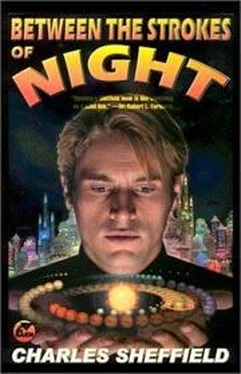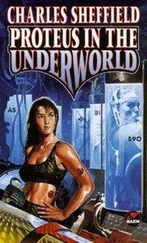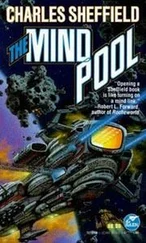“Everyone left?”
“They did; but they also left messages.”
“What did they say?”
“Better if you see for yourself, rather than my trying to summarize. We’re there.”
The robot guide was leading them into a place that seemed oddly familiar. It was the old control center for Gulf City, but a control center that had been modified by the addition of arrays of unfamiliar equipment. Most of the crew of the Argo slumped in chairs around the periphery of the chamber, with expressions ranging from suspicion to despair.
Four people stood in front of a narrow two-meter-high cylinder with rounded contours, a machine unlike anything that Charlene had ever seen before. The four were members of the Argo’s crew: Sy Day, Gus Eldridge, Eva Packland, and a taciturn technician named Delsy Gretz who was the Argo’s specialist in hardware interfaces. Gretz was holding a small gray handset, and pressing a sequence of points on its surface.
“There’s the complete set,” he said. “A hundred and seventy-eight of them.” A long list of names, each with stellar coordinates, stood out against the gray surface of the machine. Charlene recognized maybe a dozen of them: Pentecost, Kallen’s World, Wendell, Derville, Marsden, Lysander. The rest were unfamiliar, scattered more widely through the spiral arm than the stars and settled planets that she knew.
“Colonies of widely varying ages,” Delsy Gretz went on. “All apparently thriving, all working at the same time rate — N-space, no one is using S-space. And all of them apparently in communication with each other. Gulf City receives messages from every world in the galactic web, but it seems to generate none of its own.”
“I don’t get it,” Gus Eldridge said. “Gulf City is the central hub for development of this spiral arm. Decisions on new colonies, and pacing for use of resources, all come from here.”
“Not any more.” Sy had been peering at the list of worlds. He moved backward and flopped onto a chair. It was a mark of his unusual emotional condition that the man he sat down next to was Dan Korwin. “Don’t you get it?”
No one spoke, until Charlene — better a fool who would ask questions than one who would hide ignorance — said, “I don’t get anything, Sy, except that Gulf City is nothing like we expected.”
He nodded. “Right. But not just Gulf City, Charlene — the whole of the spiral arm. When we left on the Argo to travel to Urstar, we all realized we were going off on a long journey. We spent most of the trip out in T-state or cold sleep, so not much subjective time passed for us, but we knew that back here on Gulf City more than seven S-years would flash by while we were on the way there. It would take another S-year for us to return, so far as people here were concerned — our time dilation on the way back because of relativistic effects did not apply to them at all.
“We knew all this; knew, no matter what happened, that so far as anyone on Gulf City was concerned we might be gone for ten S-years, allowing a reasonable span for us to explore Urstar and try to discover what had happened there. “Our logic seemed impeccable when we left, but there was one huge flaw in it. We assumed that the way to measure time was as intervals in S-space, which is where we and the majority of people on Gulf City were and would be living. “We were wrong. Most of the new colonies are down on planetary surfaces. We have known since S-space was first discovered that even a modest surface gravity makes existence in S-space impossible, because no one would be able to walk or even stand up. They would be flat on the ground before they knew they were off balance.
“So people living on planets inhabit N-space, because they have no choice. From their point of view, the ship that left for Urstar would not be gone for just ten years or so. The Argo was gone for more than twenty thousand of their years. Long enough for many new planets to be colonized, long enough to establish an interstellar communications web, long enough to discover new branches of science totally unknown to the living fossils — us — aboard the Argo.”
Sy swept his arm around the control chamber, indicating the arrays of instruments and equipment. “How much of this do you recognize? If you are anything like me, damned little.”
Libby Trask objected, “Even if you are right about the equipment — and I must admit I don’t recognize most of it, even in my own field — it would make no sense to abandon Gulf City as the central organizing group.”
“Wrong. It would make no sense to keep Gulf City in the decision loop at all, so long as people here insisted on remaining in S-space. Interstellar communication times are long enough as it is. Can you imagine the frustration of waiting for some answer, knowing that for every day in S-space on Gulf City, two thousand days — more than five years — were flashing by on your planet? The center of action moved to the planets, coordinating their own development. This place became a backwater.”
Emil said, “A backwater, maybe. But that doesn’t account for Gulf City being totally deserted.”
“Correct. I suspect there is a different reason for that, and it’s something we’ll be able to confirm when we send messages to the planetary web and say we’re home from Urstar. When we left Gulf City, we had on board the most advanced knowledge that humans could offer. But by the standards of planetary civilizations we were travelling for a long, long time. Humans moved out of caves and into space in less time than it took us to go to and return from Urstar. I think that human scientific knowledge has moved on, far past anything with which we can claim familiarity. Someone — almost certainly, a group working on a planet and therefore working in N-space — discovered for themselves the unpleasant truths that we were warned about after our ship was halted and JN’s body was taken over. S-space, over long periods of time, is fatal to us. What was it we were told? Ultimately, time consumes flesh.”
Dan Korwin, sitting next to Sy, turned in his seat. “So everyone returned to live in normal space and time, leaving Gulf City to fade away? I don’t believe it.”
“Nor do I, and I didn’t say that. I think something much more complicated took place. I agree with the list that Delsy Gretz showed us, those are a hundred and seventy-eight different planetary colonies, all operating and communicating with each other in N-space. But there are other lists. Here’s one that I found when I was poking around.”
A group of about twenty names and coordinates appeared as glowing symbols, standing a few centimeters in front of the tall unit that still displayed Delsy Gretz’s list.
“Not nearly so many of these,” Sy said. “But there’s an important difference. Not one of them is associated with a planetary or a stellar system — not even a brown dwarf or a free-flying rogue planet. My guess is that every one is like Gulf City, as far removed as they can get from all other matter.” “Doing what?” Eva Packland was making her own rapid check, confirming that the coordinates did not correspond to any known celestial objects.
“Your guess is as good as mine. Free space facilities, far away from gravitational perturbations. Low density of interstellar matter, and with only the galactic fields as disturbance.”
“Perfect for delicate physical measurements,” said Rolf Sansome. “Minimal interference.”
“Or for long-range astronomy and astrophysics,” Eva Packland added. Sy nodded. “Both of those are logical. My own belief is a little different. Humans set up Gulf City to study parts of the universe that they didn’t understand, but this was also a fine place to explore the different states in which people can exist. S-space was used here, but this is also where the first T-state experiments were performed. I believe that those” — he pointed to the list — “represent the next generation of free-space experiment stations. Different groups had different ideas as to what should be done next. They took everything learned here on Gulf City as a starting point, and set up facilities dedicated to their own explorations.”
Читать дальше












